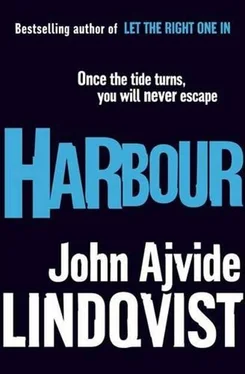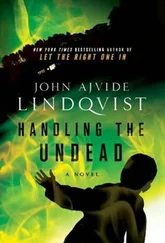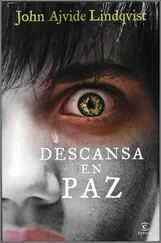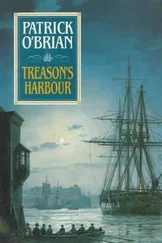When there was a lull in the conversation he leaned back in his chair, folded his hands over his stomach and looked at Simon and Anna-Greta.
'How did you two actually get together? How did you meet?'
The question provoked a simultaneous grin from Simon and Anna-Greta. They looked at each other, and Simon shook his head. 'It's a long story.'
'Is there anything that needs doing?' asked Anders. Neither Simon nor Anna-Greta could come up with anything urgent. 'So won't you tell me the story then?'
Anna-Greta looked out of the window. The wind was getting up. The sky was overcast and breakers had appeared on the grey water. A couple of raindrops hit the glass. She rubbed a hand over her forehead and asked, 'How much do you know about your grandfather?
'
On the island of Domarö there are two very special bottles of schnapps. One is down in Nathan Lindgren's old boathouse, and will no doubt remain there until his relatives finally get around to sorting through his belongings. The other is in the possession of Evert Karlsson.
Evert is almost ninety, and has kept that bottle for nearly sixty years now. No one knows what the cheap schnapps inside might taste like, and no one is going to find out either, not as long as Evert is alive. He has no intention of removing the cork. The bottle and its contents are much too good a story for that.
That's why Evert has kept it: just so that when some stranger comes along who hasn't heard the story before, he can take the bottle out of the cupboard and say, 'Have you heard about the time when Anna- Greta smuggled schnapps in on the customs boat? You haven't? Well, it was like this…'
And he tells the story as he strokes the bottle with his fingertips. It's the best story he knows and, even better, it's absolutely true. When he has finished he passes the bottle around, with strict instructions to hold it carefully and not to drop it.
People look at the clear liquid behind the glass, and nothing about it indicates that it came ashore under such remarkable circumstances. But this very liquid was part of the story that made Anna-Greta notorious throughout the entire archipelago. It is, as Evert says, the original schnapps.
Then he puts the bottle back in the cupboard, and there it stays, waiting for the next occasion when it will be brought out and the story will be told once more.
The smuggler king's daughter
Things didn't turn out the way Anna-Greta had expected at all. Erik seemed to have exhausted himself finishing the house and getting married. Once that was done he had no strength left over to set any new goals.
The summer went reasonably well, while the original flame of passion was still burning, but towards autumn Anna-Greta began to ask herself if Erik really had been in love with her. Perhaps it was just a project, like the house. Build house, install wife. Job done.
Hitler had invaded Poland in August, and there was feverish activity in the archipelago. The coastline was to be fortified, and the navy's destroyers and transport ships were shuttling between Nåten and the islands around Stora Korset, which was the last outpost facing the Aland Sea. Two gun emplacements and a number of defence posts were to be built, and several young men on Domarö were involved in the preparatory work: using explosives to make cable trenches, building walls and putting up fences. The Russian attitude to Finland had hardened, and there was a great deal of uncertainty.
Erik had used all his savings to build the house, and the newly- weds limped along on Anna-Greta's earnings as a seamstress, Erik's casual employment at the sawmill in Nåten and contributions from their parents. It grieved Erik to have to accept money from his father, and when it came to Anna-Greta's father…well, Erik came straight out with it one evening after Anna-Greta had come home with yet more money from him, 'That money comes from criminal activity, you know.'
Anna-Greta was not slow to respond. 'Better criminal activity than no activity at all.'
As the autumn progressed a chill grew between them, and when Erik's old schoolmate Björn joined the teams building defences on the outer islands, Erik went with him. Anna-Greta didn't hear a word from him for the first two weeks in October.
She went down to the jetty every time a boat came in, watched the soldiers streaming up to the shop or to their work on the building going on around the harbour, but no one knew anything about those who were working on the outermost islands. Instead she was harangued at length about the poor food, the terrible clothes, the misery in the barracks out on the islands.
After two weeks Erik came home. He did little more than change his clothes and hand over a little money, and then he was off again. Anna-Greta didn't even manage to tell him she was expecting a child, the opportunity didn't arise. But it was true. She was twelve to fourteen weeks gone, according to the midwife.
Anna-Greta stood with her hands resting on her stomach as she watched Erik climb into Björn's fishing boat. She waved with her whole arm, and got a raised hand in response. Erik was with the boys, and didn't want to embarrass himself. That was the last she saw of him.
Ten days later she received a letter. Erik had been killed in an accident while carrying out his invaluable work for the defence of his country. The body arrived the following day, and Anna-Greta couldn't bring herself to look at it. A block of stone had come away from its mortar and fallen on Erik's head as he was plastering the walls on the inside of the defence post.
'He's not exactly in peak condition, if you know what I mean,' said the lieutenant who accompanied the body.
There was a funeral in Nåten and many expressions of commiseration and half-promises of help and support, but there was no widow's pension from the army, because technically Erik had not been a member of the armed services.
Anna-Greta was nineteen years old, in the fourth month of her pregnancy and widowed. She lived in a draughty house in a place that was not her home, and she had no particular skills or expertise. It's hardly surprising that at first it was a bleak and difficult winter for her.
Torgny and Maja had become as fond of her as if she had been their own daughter, and they helped out as best they could. Her father, too, did his best. But Anna-Greta didn't want to live on handouts. She wanted to be independent, for own sake and for her child's.
On top of everything else, the winter was unusually cold. The army drove across the ice in all-terrain vehicles until the cold became so severe that the engines froze up and they went over to horses. The soldiers who were on leave had to walk across the ice from the islands out in the archipelago.
One Saturday morning as Anna-Greta sat by her kitchen window, watching yet another lemming-like procession of frozen young men approaching the shore, she had an idea. There was a demand. She would meet it.
Maja had several sacks of wool in the hayloft in the barn. It would never be used, and she was happy to pass it on to Anna-Greta, who carried the sacks down to the kitchen in the Shack, the only room she used because she wanted to save on wood. She set to work. In a week she had knitted eight pairs of gloves in felted wool, the warmest you could imagine.
On Saturday morning, she positioned herself down by the jetty in Nåten and waited for the soldiers. The thermometer had read minus twenty-two that morning, and the cold hung in the air like a silent scream. She jumped up and down on the spot while she waited for the silent horde approaching from out in the bay.
Читать дальше












